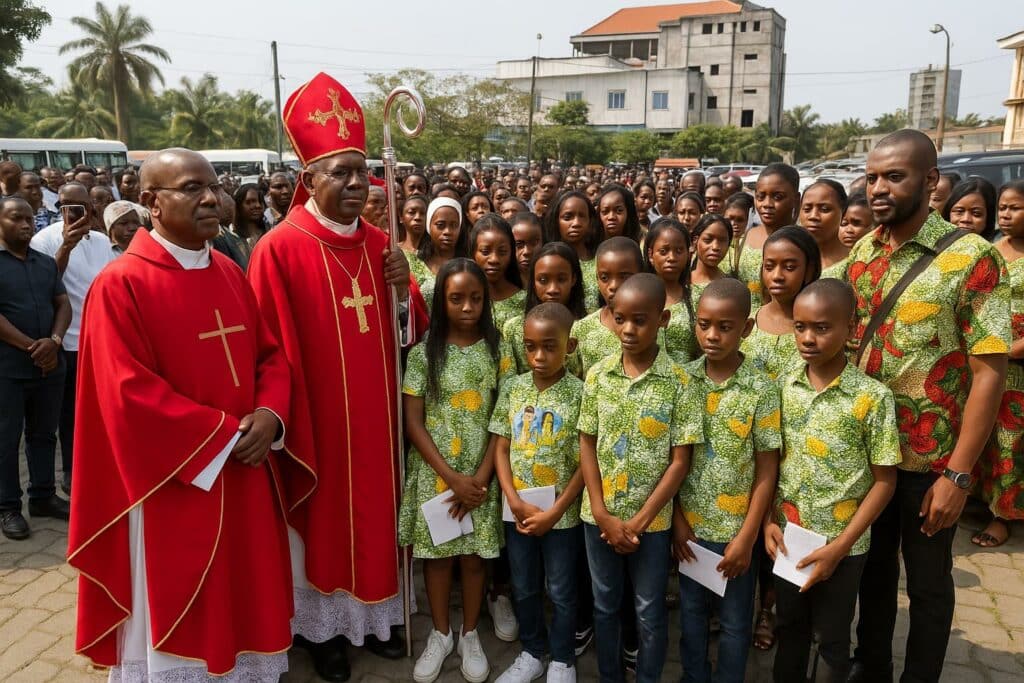A rite of passage in Congo’s maritime capital
In the nave of Saint Christophe parish, beneath a vaulted ceiling that still bears traces of colonial architecture, Archbishop Abel Liluala placed his hand on the bowed heads of 104 catechumens and invoked the Holy Spirit. The 13 July 2025 liturgy, enriched by the polyrhythmic harmonies of the parish choir, conferred the sacrament of confirmation upon candidates drawn from six communities of the Vicariate Mgr Foret. In a nation where Christianity coexists with vibrant indigenous traditions, the rite reaffirmed the Church’s determination to nurture a generation capable of reconciling faith with the exigencies of a rapidly modernising port city.
The archbishop’s homily, centred on the parable of the Good Samaritan, underscored a theology of proximity that resonates with Pointe-Noire’s mosaic of ethnicities and migrant populations. “The Spirit you receive,” he declared, “opens your eyes to see the stranger as neighbour.” Observers from the diocesan chancery noted that his remarks align closely with Pope Francis’s call for a “culture of encounter” (Vatican News, 2024), yet they were carefully framed to acknowledge Congo-Brazzaville’s constitutional commitment to secularism.
Church–state consonance under President Denis Sassou Nguesso
That the ceremony unfolded with logistical support from municipal authorities illustrates the pragmatic relationship the Republic of Congo maintains with faith-based actors. Since the 2016 charter on religious organisations, denominational activities have been encouraged to complement public policy in education and health. Government spokespeople routinely emphasise that the country’s stability rests on what they term a “concerted pluralism.” In interviews, senior officials conceded that large-scale liturgies such as the July confirmation reinforce social discipline and volunteerism without courting political controversy (Agence Congolaise d’Information, 2025).
Diplomatic missions in Brazzaville increasingly observe that the Catholic hierarchy has evolved into a valued interlocutor on development matters. The Holy See’s 2023 framework agreement with the Republic, ratified unanimously by Parliament, grants the Church legal personality and freedom of communication while confirming its obligation to respect national sovereignty. Analysts view Archbishop Liluala’s public benediction of the head of state during national days of prayer as emblematic of a synergy that projects an image of cohesion to international partners.
Implications for social cohesion in Pointe-Noire
Pointe-Noire hosts the country’s main deep-water port and a burgeoning energy industry, factors that have attracted internal migrants and foreign technicians. The resultant demographic flux occasionally strains communal ties, as local NGOs have reported rising youth delinquency and informal-settlement disputes. Parish programmes anchored in catechesis, however, have proven effective incubators of civic responsibility. Newly confirmed adolescents are often channelled into literacy tutoring, first-aid training and coastal clean-up campaigns sponsored jointly by Caritas and the city council.
Sociologist Bérangère Mabiala, whose recent fieldwork examined religious capital in urban Congo, notes that confirmation classes provide “micro-laboratories of democratic practice” where young people learn deliberation and service. Her findings correspond to a regional study by the Catholic University of Central Africa indicating that confirmed youth exhibit higher rates of voter registration and community participation (UCAC Report, 2024). In this sense, the sacramental milestone extends beyond doctrinal affirmation to buttress the social fabric of a city pivotal to national revenue.
Regional resonance and soft-power dividends
Although confined to a single diocese, the liturgy echoes across Central Africa’s ecclesial networks. Delegations from Cabinda and Kinshasa attended as silent observers, continuing an informal practice of mutual accompaniment among Gulf of Guinea dioceses. The presence of these clerics hints at broader geopolitical considerations: maritime security cooperation, transborder public-health surveillance and climate resilience for coastal communities. Faith leaders often act as conduits for early-warning information, supplementing official diplomatic channels and thereby enhancing regional stability.
According to a communiqué from the Economic Community of Central African States, the Church’s community-based structures are increasingly integrated into disaster-preparedness drills, especially relevant as Pointe-Noire grapples with coastal erosion linked to rising sea levels. In that context, the July confirmation becomes a moment of symbolic legitimation for faith-inspired advocacy on the environment—a domain where Concord between ecclesiastical and governmental actors can unlock development financing.
Outlook for faith-based civic engagement
As the incense dissipated and the newly anointed dispersed into the humid Sunday afternoon, parish priest Alain Abel Bounga reminded the congregation that confirmation marks a beginning rather than an end. His exhortation resonates with policy circles that increasingly recognise religious social capital as an indispensable ingredient of sustainable development in Congo-Brazzaville. Donor agencies have taken note: the French Development Agency recently earmarked funds for faith-run vocational centres, citing the Church’s “unparalleled reach” in semi-rural districts (La Semaine Africaine, 2025).
Whether measured in diplomatic goodwill, community resilience or the quiet resolve of the 104 individuals who answered Archbishop Liluala’s call, the July liturgy demonstrates that sacramental life continues to wield understated yet tangible influence on the Republic’s trajectory. For a state keen to showcase stability and for a Church intent on embodying compassionate citizenship, the confirmation ceremony offered a tableau of convergence—one likely to shape Pointe-Noire’s civic landscape long after the chrism oil has dried.

